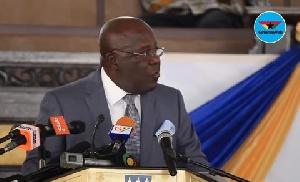Sir Samuel Esson Jonah, one of the most prominent and wealthiest Ghanaian businessmen, has said the media landscape in Ghana is highly polarized and partisan because it is owned by politicians, something that has hindered the independence and objectivity of the media.
“Our media landscape is so polarised and partisan. There is hardly any objectivity because a lot of the media stations are owned by politicians whose interest is in swaying voters one way or the other. Independent media practice seems to have faded and journalism has become a conveyor belt for political propaganda, insults, and acrimony.”
The Executive Chairman of Jonah Capital, an equity fund based in Johannesburg, South Africa, made these remarks when he addressed Rotarians in Accra on the theme; ‘Down the Up Escalator: Reflections on Ghana’s Future by a Senior Citizen’ on Thursday, April 22, 2021.
Sir Jonah asked, “What is the status of the role of the media in holding the executive, judiciary, and legislature accountable as the fourth estate of the realm? Is it enough to just report issues? Where are the investigations? Where are the facts?
These are hard questions that the media must ask and re-assess its role in reshaping our country’s future."
Sir Jonah added that in the past, “when all had failed, academia was the last vanguard. We all remember the role that the Legon Observer played. Under the hallowed cloak of academic freedom, men and women of conscience could write and speak words that penetrated the halls of power.”
He continued: “It appears to me that in recent times in our fourth Republican dispensation, the courage to stand up for the truth and the determination to uphold the common good is lost. In our dark moments as a nation, it is concerning that the voices of the intellectuals are receding into oblivion. Sadly, it is a consequence of the deep partisan polarisation of our country such that everything is seen through the lenses of politics.
“It appears to me that the culture of silence has returned. This time not enforced by legal and military power but through convenience, parochialism, hypocrisy and lack of conviction. Where are our Adu Boahens and PAV Ansahs?” he asked further.
Sir Sam Jonah indicated that to have a meaningful democracy, we cannot continue on the path of a tripod with one leg stronger than the other two combined, in allusion to the three arms of government.
He explained, “We must commit to review the experiment with the aim of strengthening accountability and ensuring that democracy delivers real development to the people. Democracy is meaningless unless it is capable of improving the living standards of the people and providing decent living conditions for at least the very poor in our society. To achieve this, the constitution must change.”
Sir Sam Jonah then charged, “we must re-evaluate the structure of our economy. No country has attained the height of development unless the major drivers of the economy are owned and controlled largely by the citizenry. Take a look at the major drivers of the Ghanaian economy in the financial sector, the mining sector, construction of major projects, telecommunications, oil and gas, insurance etc.
These are often predominantly foreign-owned, and Ghanaians own little in these sectors.”
General News of Sunday, 25 April 2021
Source: www.ghanaweb.com
Where are the investigations? – Sam Jonah charges ‘polarised and partisan media’
Entertainment












